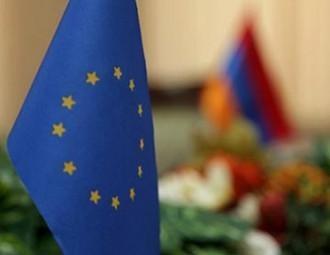Ulad Vialichka: For now there is no alternative to the Eastern Partnership

The Eastern Partnership program may become the basis for a new strategy of the European Union in relation to Eastern Europe.
On December 12-13 Armenia hosted an international conference “Armenia-EU relations: Prospects after the Vilnius summit”.
“Such conference is a good indicator of the civil society status itself,” – says Ulad Vialichka, the Chairman of the Coordinating Committee of the National Platform of EaP CSF, who was attending the forum.
He shared his thoughts about the future of the Eastern partnership with “EuroBelarus” Information Service.
The Conference was held by Armenian National Platform of the Eastern Partnership Civil Society Forum in cooperation with a delegation of the European Union. On the one hand it is an attempt to review the current situation in Armenia regarding the processes in the framework of the Eastern Partnership. On the other hand, it is an attempt to stimulate Armenian actions regarding new agreements and intentions of joining the Customs Union.
The Customs Union is a new political focus for Armenia. Armenian National Platform and other Armenian social organizations try to understand what development perspectives await the country in the both directions.
At the Vilnius summit Armenia not only refused to sign an association agreement with the EU, but also announced its intentions to join the Customs Union as well as subsequently participate in the formation of the Eurasian Economic Community. Has civil society figured out what caused this dramatic change of Armenia’s position?
The official position is not represented here because it is a serious political decision. To criticize or to support it we need meaningful grounds. Basically, Armenian independent public organization associate this decision with personal ambitions and plans of the political elite which is in power; they believe that the decision is not dictated by Armenian interests, but by certain profit the political elite will receive in the result of their choice.
How do the forum participants assess the European perspectives of Armenia after the Vilnius summit?
Of course, the participants understand that the choice of Armenia and the focus on the Customs Union will evidently affect the country’s European perspective. If six months ago Armenian civil society found the development of their state quite positive, after this decision they see certain risks connected primarily to the security and independence. The civil society wonders how much the decisions of Armenia will be independent; as the Customs Union presents for them a danger of losing the sovereignty.
All this will obviously affect the European vector, as even among the Armenian officials there is a certain disappointment as the previously declared Europeanization policy is suspended now through the Customs Union.
Civil society believes that the cooperation within the Eastern Partnership as well as the policy of European integration should be prioritized. By the way, Armenian civil society is the only side opposing the relations with the Customs Union. The majority of political parties are quite nonaligned in their attitude towards the intentions of joining the Customs Union.
The fate of the Eastern Partnership is largely dependent on the outcome of Eurorevolution in Ukraine. In the light of the Ukrainian events, what perspectives does Armenian civil society see for the Eastern Partnership?
Armenian civil society keeps a close watch on the events in Ukraine. Some Armenian organizations decided to show solidarity and sent their representatives to Kiev. We should note that it is not that simple for the Armenian organization as compared to Belarusian ones; the distance between the countries is quite big.
But the events in Ukraine are followed with great attentiveness. The decisions of Armenian and Ukrainian governments are not identical, but there are similarities between them. Therefore, this issue has been actively discussed at the conference. What can guarantee a consistent movement towards European integration? Why are these problems relevant both for Ukrainian and Armenian society?
Recently Putin has been on a visit in Armenia where the protests over the Customs Union were taking place, though on a slightly different scale than in Ukraine. Still, the protests were held. That is why the subject of Ukraine is crucial in Yerevan these days.
Armenia and Ukraine suddenly found themselves, roughly speaking, on the sidelines of the Eastern Partnership program. Is the future of the EP as a whole disputed because of this?
Neither Armenian nor Ukrainian situation is clear yet; they are still not matches to Belarus. Considering the degree of non-integration with Europe, the situation in Europe is much worse than in Armenia or Azerbaijan. Note that representatives of official Yerevan assist at the events of National Platform CS of Armenia which does not happen in Belarus. Just small touches to the whole picture…
You want to know to what extent Ukraine or Armenia will become outsiders of the Eastern Partnership? While the situation has not cleared up completely, we should keep a close watch on it.
I think the Eastern Partnership will not dismantle, because at present there is no alternative to it. It is the only systemic initiative of the European Union that relates its neighbours in the East. Even the critical situations in several member countries are unlikely to cause the renunciation of the Eastern partnership as part of the Neighbourhood Policy of the European Union. If the EU reacts to the crisis wisely, it may help the EU to develop a new strategy rather than discourage the EU to not cooperate with the region at all. The refusal from cooperation is absolutely wrong.
-
03.01
-
07.10
-
22.09
-
17.08
-
12.08
-
30.09








































